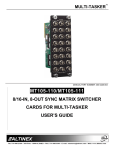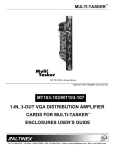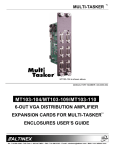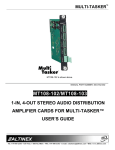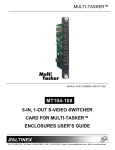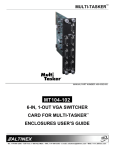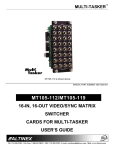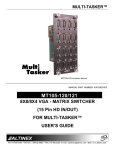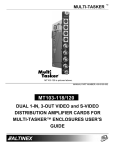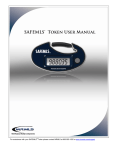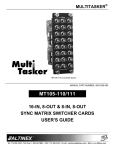Download Altinex MT105-100 User`s guide
Transcript
MULTI-TASKER MT105-102 is shown above. MANUAL PART NUMBER: 400-0181-003 MT105-102/MT105-103/MT105-105 8-IN, 8-OUT VIDEO MATRIX SWITCHER TM CARDS FOR MULTI-TASKER USER’S GUIDE MULTI-TASKER TABLE OF CONTENTS Page PRECAUTIONS / SAFETY WARNINGS ............... 2 GENERAL.......................................................... 2 INSTALLATION ................................................. 2 CLEANING ........................................................ 2 FCC / CE NOTICE ............................................. 2 ABOUT YOUR MULTI-TASKER™ ........................ 3 TECHNICAL SPECIFICATIONS ........................... 3 PRODUCT DESCRIPTION ................................... 4 APPLICATION DIAGRAM ..................................... 5 INSTALLING YOUR MULTI-TASKER™ ............... 7 OPERATION......................................................... 7 RS-232 CONTROL ............................................ 7 RS-232 INTERFACE.......................................... 7 DESCRIPTION OF COMMANDS....................... 7 SUMMARY OF COMMANDS........................... 12 TROUBLESHOOTING GUIDE ............................ 12 ALTINEX POLICY ............................................... 13 1 MULTI-TASKER PRECAUTIONS / SAFETY WARNINGS 1 Please read this manual carefully before using your MT105-102/(103)/(105). Keep this manual handy for future reference. These safety instructions are to ensure the long life of your MT105102/(103)/(105) and to prevent fire and shock hazard. Please read them carefully and heed all warnings. 1.1 GENERAL • Qualified ALTINEX service personnel, or their authorized representatives must perform all service. 1.2 INSTALLATION • • • • • To prevent fire or shock, do not expose this unit to rain or moisture. Do not place the MT105102/(103)/(105) in direct sunlight, near heaters or heat radiating appliances, or near any liquid. Exposure to direct sunlight, smoke, or steam can harm internal components. Handle the MT105-102/(103)/(105) carefully. Dropping or jarring can damage the card. Do not pull the cables that are attached to the MT105-102/(103)/(105). Insert the card carefully into the slots of the Multi-Tasker™ without bending any edges. 1.3 CLEANING • Clean only the connector area with a dry cloth. Never use strong detergents or solvents, such as alcohol or thinner. Do not use a wet cloth or water to clean the card. Do not clean or touch any component or PCB. 1.4 FCC / CE NOTICE • • This device complies with part 15 of the FCC Rules. Operation is subject to the following two conditions:(1) This device may not cause harmful interference, and (2) this device must accept any interference received, including interference that may cause undesired operation. This equipment has been tested and found to comply with the limits for a Class A digital device, pursuant to Part 15 of the FCC Rules. 2 These limits are designed to provide reasonable protection against harmful interference when the equipment is operated in a commercial environment. This equipment generates, uses, and can radiate radio frequency energy and, if not installed and used in accordance with the instruction manual, may cause harmful interference to radio communications. Operation of this equipment in a residential area is likely to cause harmful interference in which case the user will be required to correct the interference at his own expense. Any changes or modifications to the unit not expressly approved by ALTINEX, Inc. could void the user’s authority to operate the equipment. MULTI-TASKER ABOUT YOUR MULTI-TASKER™ 2 Outputs Output Connector Compatibility MT105-102/MT105-103/MT105-105 8-in 8-out Video Matrix Switcher Cards Composite Video (NTSC, PAL, SECAM) Using 2 Cards S-Video Using 3 Cards Component Video Using 4 Cards RGBS Using 5 Cards RGBHV Table 1. MT105-102/(103)/(105) General Using 1 Card The MT105-102/(103)/(105) is a 8-in 8-out Video Matrix Switcher Card designed for use with the Multi-Tasker. When installed in the enclosure (MT100-100), this card enables 8 composite video sources to be connected and switched to eight different display or recording devices. MECHANICAL The MT105-102 uses solid state switching technology and offers a video bandwidth of 450 MHz, enabling it to pass high-resolution video signals without degradation. ELECTRICAL MT105-102/(103)/(105) Input Signals Impedance 75 Ohms Analog 1.5V p-p max. Output Signals Impedance 75 Ohms Gain 1.05 Frequency Compatibility Bandwidth MT105-102 350 MHz @ -3dB MT105-103 200 MHz @ -3dB MT105-105 425 MHz @ -3dB Power Power from Power +6V -6V MT100-100 Consumption MT105-102 350mA 280mA 3.8 watts MT105-103 350mA 280mA 3.8 watts MT105-105 350mA 280mA 3.8 watts Table 3. MT105-102/(103)/(105) Electrical The MT105-103 provides an economical application that does not involve the use of extremely high-resolution computer video signals. This card is designed for 325 MHz bandwidth performance. The higher performance MT105-105 card offers a video bandwidth of 425 MHz, which is capable of handling QXGA resolutions, and for ultra-high bandwidth applications. Inputs are selected through easy-to-use ASCII commands from a control system or computer connected to the RS-232 port of the Multi-Tasker Enclosure. FEATURES/ DESCRIPTION GENERAL Inputs External Input Connectors Internal Input Connectors MT105-102/ (103)/(105) Enclosure Slots Required Two Weight 1.36 lb (0.62 kg) Connector Panel Black T° Operating 10°C-35°C T° Maximum 50°C Humidity 90% non-condensing MTBF (calc.) 40,000 hrs Table 2. MT105-102/(103)/(105) Mechanical Multiple MT105-102/(103)/(105) cards can be installed in the enclosure to provide additional functionality. For example, two cards can be used to handle the two components of an S-Video signal (Chroma and Luma), three cards to handle Component Video, and five cards to handle RGBHV. TECHNICAL SPECIFICATIONS 8 8 BNC Female 3 MT105-102/(103)/(105) 8 8 BNC Female Two 8-pin Jumpers 3 MULTI-TASKER PRODUCT DESCRIPTION 4 4 MULTI-TASKER APPLICATION DIAGRAM 5 5 5 MULTI-TASKER Block Diagrams: Internal View of MT105-102 6 6 MULTI-TASKER INSTALLING YOUR MULTI-TASKER™ After processing a command, an OK or ER string will be returned as feedback if "F" is included at the end of a command string or if the unit ID is zero. Commands such as [ON], [OFF], and [IO] that end in "S" will be saved into memory. Commands not ending in "S" will still be executed but will not be restored when the system is reset (power off & power on again). 6 Step 1. Slide the MT105-102/(103)/(105) into an available slot in the Multi-Tasker™ Enclosure in order to connect to the bus. Make sure that the MT105102/(103)/(105) card fits into place. Secure the card to the Multi-Tasker™ by tightening the retainer screws located on the top and bottom of the MT105102/(103)/(105). 7.2 DESCRIPTION OF COMMANDS Each command consists of three parts: function, card ID, and unit ID. [Function, Card ID, Unit ID]. Step 2. Connect a coaxial cable from the video source to the input connector of the MT105-102/(103)/(105). Connect the output connectors of the MT105102/(103)/(105) to the display devices through a coaxial cable. Example: [VERC3U2] VER = function C3 = Card ID U2 = Unit ID For function, see a detailed explanation under each command description. Card ID is an assigned value from 1 to 19, (1 to 8 or 1 to 2 depending on which enclosure is being used); based on which slot the card is put in. Card ID 0 (C0) is used for the controller (see user’s guide for the MT100-100). Changing the position of a card will significantly affect the commands recorded on software definitions or a third party control system. Unit ID has a value from 0 to 9. Unit ID 0 should be used for single unit operation. If the Unit ID is set to 0, then each command can be used without Ui (use command [SETU0]; see user’s guide for the MT100-100). Example: Step 3. Starting from the left, identify the slot number where the MT105-102/(103)/(105) card is plugged into the Enclosure and note that it is for RS-232 control. OPERATION (for MT105-102 & MT105-103 only) 7 7.1 RS-232 CONTROL The outputs of the MT105-105 card are always enabled; therefore, no RS-232 control is necessary. When used in the Multi-Tasker™ Enclosure, the MT105-102/(103) has many advanced remote control capabilities, which are accessible through standard RS-232 communication. The actual controlling can be accomplished through a computer control system or any other device capable of sending RS-232 commands. 7.2 RS-232 INTERFACE [VERC3]: for unit ID zero (equivalent [VERC3U0]) [VERC3Ui]: for unit ID other than zero to 1. [VER] The RS-232 commands for the MT105-102/(103) are in a simple ASCII character format. 1. Square brackets “[ ]” are part of the command. 2. Use uppercase letters for all commands. This command displays the software version and card type for the MT105-102/(103) card. Command Format: [VERCnUi] Cn = card ID (n = slot # from 1 to 19) (1 to 8 for MT100-101 or 1 to 4 for MT100-103) 7 7 MULTI-TASKER Ui = Unit ID (i = # from 0 to 9) (refer to the MT100-100 user’s guide for explanation) Input2 is connected to Output7 and Output7 is disabled Input5 is connected to Output8 and Output8 is disabled Note: If there is no card in slot #2 of unit 3, sending the [C2U3] command will not return any feedback. Example: If one MT105-102 card is in slot #4 of unit 3: When sending command [VERC4U3], the MultiTasker™ Enclosure will return feedback as: MT105-102 690-0126-011. ERROR CODES 2. [C] ER01: CPU Error This command displays the status of the card and connections of the Matrix Switcher. Command Format: [CnUi] Cn = card ID (n = a slot # from 1 to 19) (1 to 8 for MT100-101 or 1 to 4 for MT100-103) Ui = unit ID (i = 0 to 9) (refer to the MT100-100 user’s guide for explanation) This type of error indicates that the CPU is not working properly. ER02: I²C Communication Error This means that the communication between the MT105-102/(103) card and its serial device has failed. ER03: RS485 Communication Error Example: This type of error is a communication error between the MT105-102/(103) card and the controller of the Multi-Tasker™ Enclosure. If one MT105-102/(103) card is in slot #2 of unit 3 with output 1, 2 and 3 ON: When sending command [C2U3], feedback will be returned as: Config:8X8 In1 Out1 ON In2 Out2 ON In1 Out3 ON In2 Out4 OFF In8 Out5 OFF In7 Out6 OFF In2 Out7 OFF In5 Out8 OFF [CiS] -This command saves card status settings, such as output ON/OFF, IN/OUT connections. 3. [IO] This command will connect input x with output y, but the user needs to use [ON] command to enable this output. Command Format: [IxOyCnUiS] Ix = select input x (x is from 1 to 8) Oy = connect to output y (y is from 1 to 8) Cn = card ID number (n is from 1 to 19) (1 to 8 for MT100-101 or 1 to 4 for MT100-103) Ui = unit ID (i is from 0 to 9). (Refer to MT100-100 user’s guide to set Unit ID) S = saves command to memory Description of Feedback: Input1 is enabled Input2 is enabled Input1 is enabled Input2 is disabled Input8 is disabled Input7 is disabled connected to Output1 and Output1 is connected to Output2 and Output2 is connected to Output3 and Output3 is [ImO*…] –This command connect input m to all outputs. connected to Output4 and Output4 is connected to Output5 and Output5 is 4. [ON] connected to Output6 and Output6 is 8 8 MULTI-TASKER This command enables one or more outputs of a single card or group of cards. • m = output number (m =1 to 8) n = card ID No. (n = a slot # from 1 to 19) (1 to 8 for MT100-101 or 1 to 4 for MT100-103) P = path [ONmCnUiS]: for a single card This command enables output “m” without affecting any other outputs. Default when plugged in = Input 1 is ON m = Output number (m = 1 to 8) n = Card ID number (n = 1 to 19) (1 to 8 for MT100-101 or 1 to 4 for MT100-103) i = Unit ID number (i = 0 to 9) S = saves command to memory Example: Example: If 2 cards are at slot 6 and 7 of unit 3: To enable output 1 and 2 of card 6 and output 3 and 4 of card 7 simultaneously, use the following commands: [ON12C6U3P] [ON34C7U3P] [SW] If "F" is included use the [ONmCnUiPF] command or the [ONmCnUiFP] command. 1) [ON12C5U3]: Turns ON only output 1 and 2 of the MT105-102/(103) card located in slot #5 of the MT100-100 Enclosure with unit ID3. 2) [ON3C5U3]: Turns ON only output 3 of the MT105-102/(103) card located in slot #5 of the MT100-100 Enclosure with unit ID3. After the [ON12C5U3] and [ON3C5U3] commands have been executed, output 1, 2 and 3 will be ON. 3) [ONC5U3]: Turns ON all outputs of the card. • • [ON…F]: feedback After processing a command, an OK or ER will be returned as feedback if "F" is included at the end of a command string or if the unit ID is zero. Example: [ON1C2U3F]: if path is not set [ON1C2U3PF]: if path is set [ONmGkUiS]: for a group of cards 5. [OFF] This command enables output "m" for each card in group "k" of unit "i". m = card output (m = # from 1-8) k = group number (k = # from 1-9) i = unit number (i = # from 0-9) S = saves command to memory This command disables one or more outputs of a single card or a group of cards. • [OFFmCnUiS]: for a single card This command disables output “m” without affecting any other outputs. m = output number (m = 1 to 8) n = card ID No. (n = slot # from 1 to 19) (1 to 8 for MT100-101 or 1 to 4 for MT100-103) i= Unit ID number (i = 0 to 9) S = saves command to memory [OFFCnUi]: Turns OFF all outputs of the card Example: 1. [ON1G5U1]: Turns ON output 1 for each card in group5 of unit 1. 2. [ONG5U1]: Turns ON all outputs for each card in group5 of unit 1. • [ON… P]: sets path This command will set the path for the output, but it is not active until the switch command is executed ([SW]). Commands ending in "P" are not executed immediately. The path for outputs on multiple cards or the same card can be loaded. Command Format: [ONmCnUiP] Example: 1) If card 5 of unit 3 has output 1, 2 and 3 ON: a) [OFF1C5U3]: Turns OFF output 1 while output 2 and 3 remain ON. b) [OFF23C5]: Turns OFF output 2 and 3. 2) If card 5 of unit 3 has output 1, 2, 3, 4, 5, 6, 7 and 8 ON: 9 9 MULTI-TASKER [OFFC5U3]: Turns OFF all outputs, which is equivalent to [OFF12345678C5U3]. • Example: [OFF1C2U3F]: if path is not set [OFF1C2U3PF]: if path is set [OFFmGkUiS]: for a group of cards This command disables output "m" for each card in group "k" of unit "i". Command Format: [OFFmCnUiP] m = card output (m = # from 1-8) k = group number (k = # from 1-9) i = unit number (i = # from 0-9) S = saves command to memory 6. [SW] – Switch The switch command immediately connects inputs and outputs, which were previously set with the path command on this card or any other cards in the MT100-100. Example: Example: [ON12C6U3P] [ON34C7U3P] [SW] The system will return feedback as OK if the unit ID is zero. 1. [OFF1G5U1]: Turns OFF output 1 for each card in group5 of unit 1. 2. [OFFG5U1]: Turns OFF all outputs for each card in group5 of unit 1. • [OFF…P]: sets path 7. [CLRCn] This command will set the path for the output, but it is not active until the switch command is executed ([SW]). Commands ending in "P" are not executed immediately. The path for outputs on multiple cards or the same card can be loaded. Command Format: [OFFmCnUiP] m = number (m =1 to 8) n = card ID No. (n = a slot # from 1 to 19) (1 to 8 for MT100-101 or 1 to 4 for MT100-103) P = path This command reset card Configuration (all Outputs are connected with Input1) 8. [WR] This command groups multiple cards in the MT100-100 Enclosure. Each unit contains a maximum of nine groups. Command Format: [WRCn…GkUi] n = card ID No. (n = slot # from 1 to 19) (1 to 8 for MT100-101 or 1 to 4 for MT100-103) k = group number (k = # from 1-9) i = unit number (i = # from 0-9) Example: Example: If 2 cards are at slot 6 and 7 of unit 3: To enable output 1 and 2 of card 6 and output 3 and 4 of card 7 simultaneously, use the following commands: [OFF12C6U3P] [OFF34C7U3P] [SW] If "F" is included use the [OFFmCnUiPF] command or the [OFFmCnUiFP] command. • To group card #1, 2 and 3 as group 5 of unit #1, send the [WRC1C2C3G5U1] command. After executing this command, card 1, 2, and 3 will be grouped as group 5 of unit 1. OK or ER will be returned as feedback if "F" is included at the end of a command string or if the unit ID is zero. 9. [CLMGk] [OFF…F]: feedback This command clears the members for a single group or for all nine groups. After processing a command, an OK or ER will be returned as feedback if "F" is included at the end of a command string or if the unit ID is zero. • 10 10 [CLMCnUi]: for a single card MULTI-TASKER n = Card ID number (n = 1 to 19) (1 to 8 for MT100-101 or 1 to 4 for MT100-103) i = Unit ID number (i = 0 to 9) Note that all outputs will be connected to input1. • 12. [MATmmXnn] This command allows changes in the configuration of the matrix. User can configure the MT105-102, MT105-103 and MT105-105 Matrix Switcher as 8x8, 5x5, 4x4, or 2x2 [CLMGkUi]: for a group of cards k = group number (k = # from 1-9) i = unit number (i = # from 0-9) 8x8 Example: a) To clear group #1, send the [CLRG1U1] command. This command clears the members for the specified group only. b) To clear all groups of unit 1, send the [CLRG[U1] command. OK or ER will be returned as feedback if "F" is included at the end of a command string or if the unit ID is zero. 10. [G] This command is used to request group data. With the command, the user can identify which input or output of a particular group is on. Command Format: [GkUi] k = group number (k = # from 1-9) i = unit number (i = # from 0-9) Input Output O1a O2a O3a O4a O5a O6a O7a O8a O1a O2a O3a O4a O5a O6a O7a O8a 4x4 Example: If group 1 has DA Cards with output 1, 2 and 3 on, while group 2 has SW Cards with input 2 on: 1) [G1]: will return feedback as [On123G1]. 2) [G2]: will return feedback as [On2G2]. 11. [RD] This command displays the members in each group. Command Format: [RDGkUi] k = group number (k = # from 1-9) i = unit number (i = # from 0-9) member = C1 - C19 (card 1 to 19) (1 to 8 for MT100-101 or 1 to 4 for MT100-103) Input Output O1a O1b O2a O2b O3a O3b O4a O4a O1a O1b O2a O2b O3a O3b O4a O4b 2x2 Example: To read member data for group 5 of unit 1, send the [RDG5U1] command. The system will return feedback as C1C2C3 G5U1. 11 11 Input Output O1a O1b O1c O1d O2a O2b O1a O1b O1c O1d O2a O2b MULTI-TASKER O2c O2d Solution: Check the source and make sure that there is a signal present and all source connections are correct. If the source is working and there is still no display, see Cause 2. O2c O2d 13. [HELP] B) Cause 2: The card input is not selected. This command displays all available for user Multi-Tasker interface commands. Solution: Select the card input. See RS-232 accessible commands in section 7. If no display is present, see Cause 3. 7.3. SUMMARY OF COMMANDS 1) [VER]: Displays software version C) Cause 3: Cable connections to the destination are incorrect. Solution: Make sure that cables are connected properly. Also, make sure that the continuity and wiring are good. If there is still no display present, see Cause 4. 2) [C]: Displays status of the card 3) [IO]: Connects the input to the output 4) [ON]: Turns on one or more outputs for a single card or a group of cards 5) [OFF]: Turns off one or more outputs for a single card or a group of cards D) Cause 4: The display has a problem. 6) [SW]: Switch (outputs the preloaded buffer) Solution: Make sure that the display is powered. If there is still no display, call ALTINEX at (714) 990-2300. 7) [CLR]: Reset card configuration 8) [WR]: Groups multiple cards 9) [CLM]: Clears members of a single group or all groups 10) [G]: Requests group data 11) [RD]: Displays the members in each group 12) [MATmXnCi]: Allows changes in the configuration of the matrix. 13) [HELP]: Displays all available commands TROUBLESHOOTING GUIDE 8 We have carefully tested and have found no problems in the supplied MT105-102/(103)/(105); however, we would like to offer suggestions for the following: • 8.1 NO DISPLAY A) Cause 1: The source has a problem. 12 12 MULTI-TASKER ALTINEX POLICY 9 9.1 LIMITED WARRANTY Please refer to Altinex web site for details on product warranty. 9.2 RETURN POLICY Please refer to Altinex web site for details on return policy. 9.3 CONTACT INFORMATION ALTINEX, INC. 592 Apollo Street Brea, CA 92821 USA TEL: 714-990-2300 TOLL FREE: 1-800-ALTINEX WEB: www.altinex.com E-MAIL: [email protected] FAX: 714-990-3303 13 13















